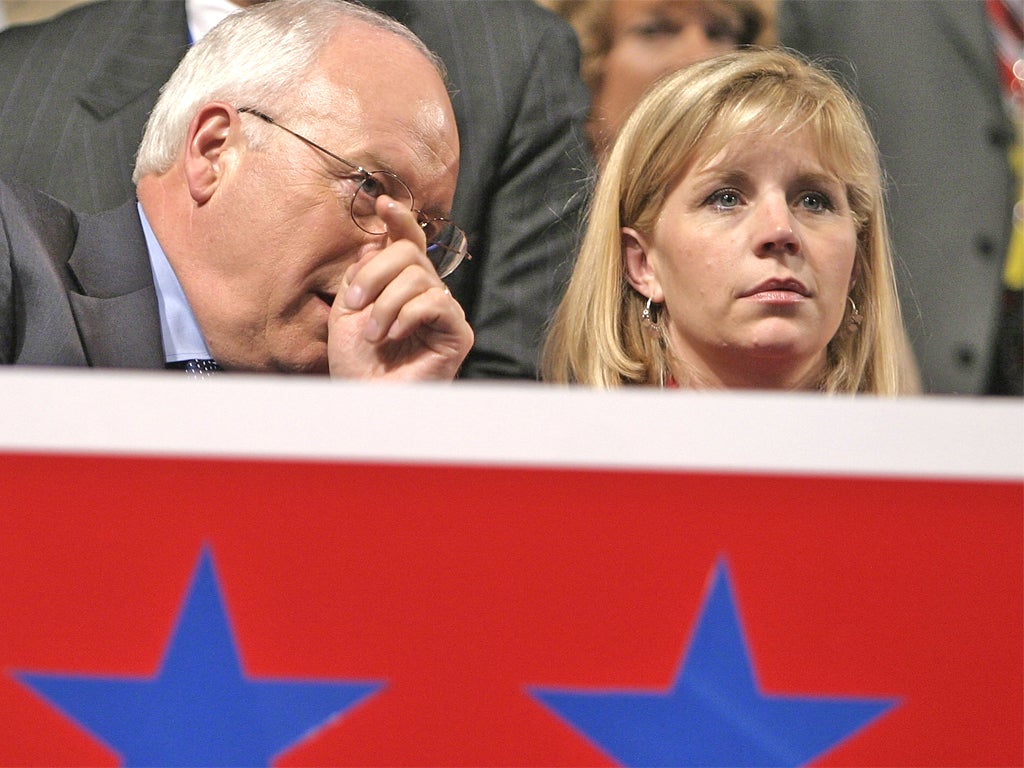Afghanistan? Iraq? Nope, Dick Cheney doesn’t believe in regrets
You'll be hard pressed to find contrition in this apparent autobiography


Dick Cheney is back – back from the dead I almost wrote, but of Dubya’s neo-cons he is the one political survivor. He could easily have died of cardiac arrest while Vice President in the hours after the 9/11 attacks, when Bush was stuck in Florida and he was in the White House bunker and in charge. Instead he has outlasted five heart attacks, the discrediting of all his major policies and the disappearance of the neo-cons as a significant political force.
Now, with a fine new heart, he is still thumping that old tub, calling for war on Iran, defending the torture of terror suspects – a practice he introduced. Il ne regrette rien. Alone of Bush’s men, he has even been taken up by the Tea Party.
He is in the news because he has just published a book about his medical woes, co-written with his cardiac surgeon. He had his first heart attack aged 37 when he was a freshman in Washington, chief of staff in President Ford’s cabinet. A more prudent fellow would have gone back to Wyoming and found a less stressful occupation. After all, he had avoided previous life-threatening challenges, having obtained five deferments from fighting in Vietnam. But while that promised only death, Washington offered glory. Cheney went for it.
Since then, he has survived four catheterisations, quadruple bypass surgery and finally a transplant to replace his original heart, which had swollen to the size of a football. Interviewed by Dr Sanjay Gupta, a medical doctor and TV journalist, he refused to be drawn by a reference to “numerous studies showing a link between heart condition and memory loss, depression, decline in decision-making ability and impaired cognition due to limited blood flow to the brain.” “I didn’t know about it and I wasn’t worried about it.”
This refusal to be bowed by his life-threatening disease is the key to his long-running popularity. He may have been passing through the Valley of the Shadow of Death, but his ashy pallor, gritted teeth and gravelly growl all said plainly that he was the meanest motherfucker in the valley. He was a political John Wayne for the anaemic post-Vietnam age, when US supremacy began to seem perilously poised.
That defiant belligerence may also explain the disastrous policies for which history will hold him to account, culminating in the invasions of Iraq and Afghanistan. All showed a determination to stun the world with the brute reality of the US military, exploding the existing order but with no joined-up idea of what to replace it with.
Perhaps in a period of medical calm he had a moment of clarity. The first Gulf war, which he oversaw as the first President Bush’s Secretary for Defence, resulted in just 146 American dead, and the allies withdrew without seizing Baghdad or challenging Saddam’s grip on power. Cheney explained why. “Once you got to Iraq and took down Saddam Hussain’s government, then what are you going to put in its place?” It’s a question people are still asking. It doesn’t appear to have an answer, at least not one we can stomach. “If you take down the central government,” he reasoned, “you could very easily end up seeing pieces of Iraq fly off.”
Dick Cheney seems to me the exemplary figure in America’s decline, at the crucial moment when fear of humiliation and of losing the reputation of absolute supremacy blinds the faculties of reason. With that blind imperial rage goes a sort of twisted melancholy, something that reminds me of analogous figures in Britain’s imperial recession from Curzon to Kipling, all animated by bitter nostalgia and with sadistic tendencies masquerading as patriotic obligation. Asked about waterboarding, Cheney once replied, “Tell me what terrorist attacks you would have let go forward because you didn’t want to be a mean and nasty fellow? Are you going to trade the lives of a number of people because you want to preserve your… honour?” Too late for that, Mr Cheney.
The secret of the Taliban’s success
Twelve years ago, after the start of the Afghan bombing campaign, I travelled down the North-West Frontier, south of Islamabad, to find out what the local people thought of it. I stopped in the town of Tank, where Sir Mortimer Durand, the man who drew the artificial border between Pakistan and Afghanistan, was knocked from his elephant while going through a low arch, and killed. I was surrounded by a lively crowd. “We all support the Taliban here,” I was told. I have no doubt they would say the same today.
In essence the futility of this Afghan war, like the previous ones, is easily explained. The only way we can obtain local support is by purchasing it. A culture of corruption quickly sets in, to which the only antidote appears to be the claimed simplicity, honesty and piety of the Taliban. This is what has put paid to us. “The English cannot win this war,” a young man told me with a sinister smile, drawing his thumb across his throat. “To repay these attacks we will do much harm to the English.”

Join our commenting forum
Join thought-provoking conversations, follow other Independent readers and see their replies